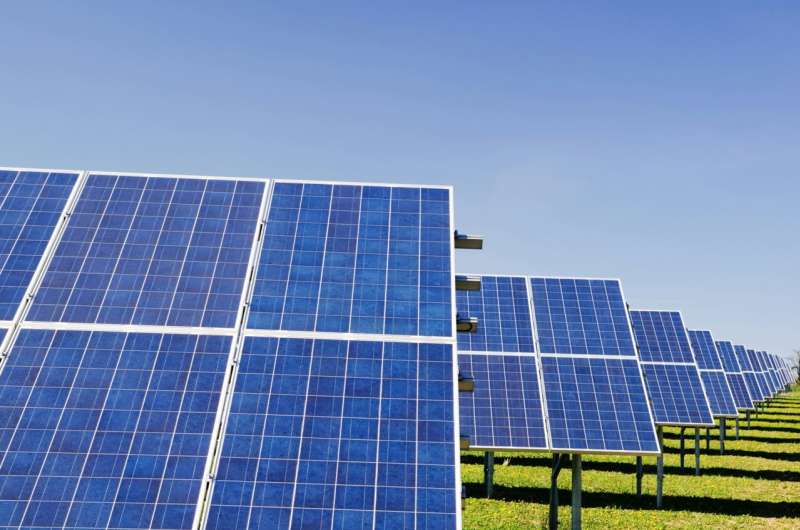This article has been reviewed according to Science X's editorial process and policies. Editors have highlighted the following attributes while ensuring the content's credibility:
fact-checked
trusted source
proofread
Stable profits, land preservation matter to farmers debating solar leases

To solar or not to solar? While a stable and predictable profit is an important factor to Pennsylvania farmers considering leasing out their land for solar energy development, it's not enough on its own, according to a new study led by Penn State researchers.
Kaitlyn Spangler, assistant professor of community development and engagement in the College of Agricultural Sciences and lead author on the study, said the findings are a steppingstone to understanding the state of solar energy development in rural communities across Pennsylvania and identifying ways to help ensure that these agreements are mutually beneficial.
For the study, recently published in Energy Research & Social Science, the researchers interviewed farmers and solar stakeholders from across Pennsylvania about how they made decisions regarding solar leases. In these agreements, farmers typically rent out their land to solar developers for an initial period of 25 to 30 years, during which solar panels are installed on the land and render it unusable for growing crops.
The researchers found that in some cases, farm owners declined these leases because they felt their land was too valuable not to use for agriculture. For example, they felt it was important to farm on land kept in their family for generations or needed every acre to ensure their farm stays profitable.
On the flip side, some described the impermanence of solar panels as a selling point, especially when compared to selling land for industrial development. In these cases, farmers described solar leases as a way to protect their land and preserve the option for the family to potentially farm it again once the lease contract expires.
"We want transitions toward renewable energy to be centered on justice and equity while valuing the dynamic needs of rural communities, among others," Spangler said. "This research helps chart a path toward increasing the transparency of where, how and for whom these transitions are already occurring."
Solar energy has become more popular as an alternative form of energy in recent years, the researchers said. Not only does the sun provide the most abundant source of energy available on Earth, but solar photovoltaics—devices that gather energy from the sun and are more commonly known as solar panels—have dropped in price significantly over the past decade.
Solar photovoltaics require large areas of land that ideally are close to infrastructure such as electric substations, making some areas of farmland an attractive option for installation.
Hailing from Berks County, Spangler said she found herself in conversations with an extended family member who also happened to be a fourth-generation dairy farmer, discussing the fact that solar developers had been approaching local farmers.
"Some of those leases got approved, others did not and others were not even entertained by the farmers and their families," Spangler said. "I wanted to understand more broadly why and how these processes and decisions were taking shape."
For the analysis, the researchers interviewed nine solar stakeholders—including representatives from solar companies, solar lease lawyers and municipal officials—and nine farmers from across the state who had been offered a solar lease for their farm and/or are engaged in on-farm solar leasing.
Spangler said Pennsylvania is an interesting place for the study because of its vast network of power lines and energy infrastructure, as well as a strong presence of small-scale and family-owned farms.
"Pennsylvania has a complex mixed-use landscape with long, complicated histories of energy extraction, like coal mining and fracking, in rural communities," she said. "So, in many ways, Pennsylvania provides a fascinating opportunity to understand how renewable energy transitions build from what has happened in the past toward something new."
In addition to data about how farmers make decisions about whether to enter leases, the researchers also gained insight into how common certain practices are in those lease agreements.
They found that "agrivoltaics"—the simultaneous use of land for both agriculture and solar energy generation—is not standard in most solar leases. For example, sheep could be grazed under solar panels, or other dual-use options could be explored to continue active agriculture.
In this study, farmers and developers described agrivoltaics as a potential priority in future years, but they often did not factor it into their current long-term plans. In the College of Agricultural Sciences, other research teams are assessing the feasibility and impacts of dual land use options, such as specialty crop production, that may provide easier-to-implement agrivoltaics in the future.
Spangler said they also found that nondisclosure agreements and option contracts are common in the beginning stages of a leasing process.
"These types of agreements are a departure from the days of oil and gas leases and may be a barrier to farmers collectively discussing and negotiating fair lease terms," Spangler said. "This might limit farmers from openly communicating about how to navigate energy options that are best for them."
In the future, the researchers said, additional studies could include a broader number of farmers, broaden the focus to include the mediating roles and relationships of utility companies, and work to better understand the desires and needs of implicated rural communities.
More information: Kaitlyn Spangler et al, Just energy imaginaries? Examining realities of solar development on Pennsylvania's farmland, Energy Research & Social Science (2023). DOI: 10.1016/j.erss.2023.103394















